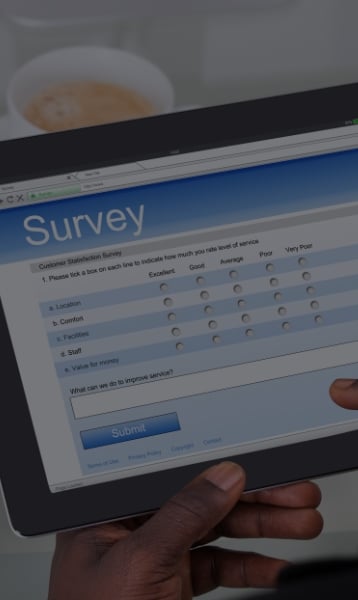The benchmarking portal gives you access to all reports available for STD, LTD, FML & WC.
Growing Number of CFOs make Health Benefits Strategy Decisions According to New Integrated Benefits Institute Study
Marshall Riddle
Growing Number of CFOs make Health Benefits Strategy Decisions According to New Integrated Benefits Institute Study
The C-suite understands and highly values the linkage of benefit programs and employee health to business performance
OAKLAND, CA – October 22, 2020 – More than half of America’s chief financial officers (CFOs) make all or most benefits decision according to a new study from the Integrated Benefits Institute, a non-profit health and productivity research organization. The report offers insights to assist human resource, benefits managers and other stakeholders to foster a better understanding with CFOs and other senior financial executives of the impact of health and wellbeing investments to productivity and business performance.
“Given the far-reaching impact of the pandemic to health and the economy, it’s even more important that employers maximize resources for the wellbeing and productivity of their employees,” said Brian Gifford, PhD, Director, Research and Analytics at IBI. “Our study highlights the value of conversations with CFOs to build the case for health as a business strategy. If you communicate the value of health investment as if they are strictly focused only on costs, then you run the risk of being tone deaf to what they are strategically trying to accomplish for their businesses and organizations.”
Additional findings of IBI’s study include:
- Taking a strategic view that health benefits is broader than health care, three-quarters consider time-off or wellbeing programs as part of the benefits strategy.
- Costs are important to CFOs with 55% stating agree strongly or agree, but not dominant as 77% stated agree strongly or agree that linking workforce health to operation metrics helps company make better decisions about investing in employees’ health.
- CFOs recognize the non-financial impacts of illness, indicating that increased demands on other employees, lower revenues, higher chance of business errors, decreased customer service quality and missed deadlines as the top five most serious business consequences of poor health and performance.
- Less than half of CFOs are very confident that their health benefits strategy supports employees’ ability to function well on the job. But both financial and non-financial health and productivity data inspire confidence that benefits contribute to business success.
- More data is not always better and health spending data doesn’t make the biggest difference to benefits confidence. Respondents indicated that the biggest confidence boosts come from data linking employees’ health to operation outcomes, followed by health care utilization and employees’ mental health conditions.
“We’re seeing a shift from employers offering benefits and generous leave policies as a way to recruit and retain a strong workforce, to now having to do more with less due to the continuing fallout and disruption resulting from the pandemic,” said Kelly McDevitt, President, IBI. “Given the tremendous impact to job performance and productivity, the importance of keeping health at the core of health benefits has been magnified, and CFOs are important stakeholders in developing these strategies.”
About the survey
The online survey assessed how CFOs and other senior financial executives view the impact of employees’ health and their health benefits strategy—including health care and disability insurance, paid leave and sick days, and wellness/wellbeing programs—on business performance. It was completed by 318 executives in May 2020. Partial funding for the study was provided by Kaiser Permanente.
More information can be found in the research publication: https://www.ibiweb.org/resource/2020-cfo-survey/.
About Integrated Benefits Institute
The Integrated Benefit Institute’s independent research, industry-leading tools and data resources help companies link health-related programs to the outcomes that maximize the contributions of people to productivity and business performance. Founded in 1995, IBI is a national nonprofit research organization and business association serving 1,200 employer and supplier members and their 22 million employees. For additional information, please visit www.ibiweb.org and follow us on Twitter and LinkedIn.
# # #
Media Contacts:
Cary Conway
cary@conwaycommunication.com
972.649.4707
- December 2024 (1)
- November 2024 (1)
- July 2024 (1)
- June 2024 (1)
- March 2024 (1)
- February 2024 (1)
- January 2024 (1)
- December 2023 (1)
- November 2023 (1)
- August 2023 (1)
- July 2023 (1)
- May 2023 (2)
- February 2023 (2)
- January 2023 (2)
- November 2022 (1)
- October 2022 (1)
- September 2022 (1)
- March 2022 (1)
- February 2022 (1)
- January 2022 (1)
- December 2021 (1)
- September 2021 (1)
- April 2021 (2)
- December 2020 (1)
- October 2020 (1)
- September 2020 (2)
- August 2020 (2)
- July 2020 (1)
- April 2020 (1)
- March 2020 (1)
- November 2019 (1)
- September 2019 (1)
- July 2019 (1)
- June 2019 (2)
- May 2019 (1)
- April 2019 (1)
- February 2019 (1)
- November 2018 (1)
- September 2018 (1)
- August 2018 (1)
- June 2018 (1)
- March 2018 (1)
- March 2017 (1)
- February 2017 (2)
- Absence (1)
- Absence Management (1)
- analytics (1)
- Behavioral Health (1)
- Benchmarking (2)
- Benchmarking Analytics (1)
- Benefit Design (2)
- Benefits + Plan Design (2)
- Blog (1)
- Business Performance (1)
- CDHP (1)
- CFO Survey (2)
- COVID-19 (6)
- Depression (3)
- director (1)
- Disability Leave (7)
- Extreme Weather (2)
- Family + Parental Leave (3)
- FMLA (2)
- Health + Productivity Management (3)
- Healthcare (1)
- Healthcare Costs (2)
- lost time (1)
- Manage Absence (2)
- Medication Adherence (1)
- Mental + Emotional Health (4)
- Mental Health (2)
- new hire (1)
- Parental / Family Leave (1)
- Patient-Centered (1)
- Press Releases (50)
- Preventive Care (1)
- Productivity (3)
- Research (2)
- Research Report (1)
- Return to Work (1)
- Sick Leave (2)
- Telehealth (1)
- Telemedicine (1)
- Worker's Compensation (1)
- Workplace Health Programs (1)




























